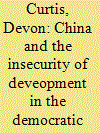|
|
|
Sort Order |
|
|
|
Items / Page
|
|
|
|
|
|
|
| Srl | Item |
| 1 |
ID:
127041


|
|
|
|
|
| Publication |
2013.
|
| Summary/Abstract |
This article analyses China's contemporary engagement in the Democratic Republic of the Congo (DRC) as an example of Chinese involvement in a resource-rich, conflict-affected country. Following a large 'minerals for infrastructure' agreement signed in 2008, China's activities in the DRC are often presented as an example of a departure from Western-led liberal peacebuilding and development, by providing 'corrupt' Congolese national elites with new sources of unchecked rents; or it is viewed as a positive alternative to Western approaches, by focusing on win-win development and reconstruction. Both these views are flawed. Rather than offering a marked alternative to a Western 'liberal' peacebuilding project, this article argues that Chinese interests have increasingly coincided with evolving Western interests in support of stabilization and market-driven economic activities. This, however, does not offer a clear pathway to security and development in the DRC. On the contrary, both Chinese and Western involvement in the DRC provide possibilities for continued insecurity, rather than any fundamental break from previous patterns and structures of politics.
|
|
|
|
|
|
|
|
|
|
|
|
|
|
|
|
| 2 |
ID:
118964


|
|
|
|
|
| Publication |
2013.
|
| Summary/Abstract |
At first glance, Burundi represents a successful negotiated transition to peaceful governance through power sharing, and a justification for regional and international peacebuilders' involvement. It is undeniable that Burundi is safer than it was a decade or two ago. Most notably, while Burundi was once known for its ethnic divisions and antagonism, today ethnicity is no longer the most salient feature around which conflict is generated. Nevertheless, this article argues that the Burundian experience illuminates international peacebuilding contradictions. Peacebuilding in Burundi highlights the complex interplay between outside ideas and interests, and multiple Burundian ideas and interests. This is illustrated by the negotiation and implementation of governance institutions and practices in Burundi. Outsiders promoted governance ideas that were in line with their favoured conception of peacebuilding, and Burundian politicians renegotiated and reinterpreted these institutions and practices. Even as international rhetoric about peacebuilding emphasized liberal governance and inclusive participation, narrower conceptions of peacebuilding as stabilization and control became dominant. Thus, encounters between international, regional, and local actors have produced governance arrangements that are at odds with their liberal and inclusionary rhetorics. Paradoxically, the activities of international peacebuilders have contributed to an 'order' in Burundi where violence, coercion, and militarism remain central.
|
|
|
|
|
|
|
|
|
|
|
|
|
|
|
|
|
|
|
|
|